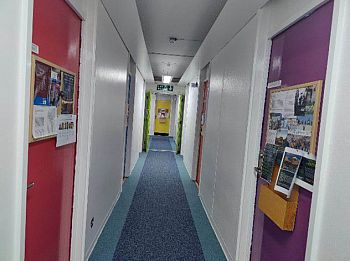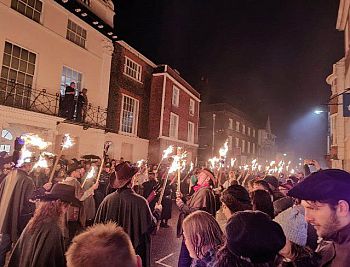Research visit to the University of Sussex, the UK: a brief report
By: Mulu Beyene
Date: 22.02.2023
Introduction
My visit to CORTH (Sussex Centre for Cultures of Reproduction, Technologies & Health) at the University of Sussex, was made possible through an existing collaboration between MATRISET, a University of Bergen-based interdisciplinary project that I belong to, and CORTH. My stay as a visitor student lasted from Oct. 31 to December 10, 2022. An initial plan to stay for a longer period was altered due to a delayed visa. During my stay, I lived in Brighton, a pleasant, hilly city located south of London. CORTH provided me with an office, and I had two mentors who helped my work: Professor Maya Unnithan, the Director of CORTH, and Dr. Maria Moscati, a co-chair of CORTH from the School of Law. The core activities planned for my stay were: discussing ideas for a paper with my mentors, giving a talk at a seminar, meeting and discussing with students and professors at relevant departments, and attending relevant events in the University.
Arrival and early days
On arrival, I was assigned an office and a pc and was quickly registered in the University system as a visiting student. Professor Maya warmly received and gave me a tour of key locations in the building where I stayed and introduced me to many professors and other staff members of the School of Global Studies. Dr. Maria also did the same a few days later at the Department of Law. The three of us also sat to better plan my stay and outlined tasks, along with timeframes. The diversity in the University community was immediately noticeable. The University, which, unlike many higher institutions in Norway, is situated in a single compound, is lively. A multi-story library, hosting good reading space and books for all disciplines was also another distinct scene.
Academic activities
I spent much of my time reading and developing some text on the human rights approach to health programs. I drafted some text and discussed it several times with my mentors who took a keen interest in what I do and provided me with helpful comments. Interesting questions were also raised, which helped me continuously revise my work. Their diverse disciplinary background made the discussions we had, both joint and bilateral, engaging.
I also presented my thoughts on the potential and limitations of using accountability as a frame of analysis to study the MDSR on Nov. 16, 2022. (MDSR is a shorthand for Maternal Death Surveillance and Response system, a maternal death tracing and review health program, which is being practiced in many developing countries). The two-hour session was attended by around 15 people in person and another 13 via Zoom. Sussex participants were mainly lawyers, political scientists and anthropologists from the School of Global Studies and Department of Law. Supervisors and fellow Ph.D. students in MATRISET also joined in from Bergen. Following my talk, an extended discussion was held, where many critical and insightful comments and questions were raised, touching on clarity of concepts, methodological issues and comments pertaining to the scope of what I was trying to write. The multidisciplinary of the attendants contributed to the diverse perspectives reflected during the discussion. Overall, the session was a new and pleasant experience for me, and I benefited from it in many ways.
During my stay, I also attended two book launch events and six presentations, covering a wide range of interesting topics. A discussion on a newly released book regarding emerging African laws was familiar and instructive. Among the presentations I attended, I found a study on gender constitutionalism in Asia particularly interesting. A discussion on infertility in India that a sociologist professor presented was also highly engaging. The fact that the work presented was based on digital ethnography rendered the conversation on methodology more interesting. Both the content and method were quite educational for me.
Meeting many people was another important task I was able to do during my visit. Accordingly, I met and discussed with some professors and Ph.D. students at the Global Studies, Department of Law, and Institute of Development Studies, and maintained contact with some of them. Exchanging ideas and chatting with many students during weekly social gatherings that the School organized was also noteworthy. Taking note of the variety of themes people write about was a source of renewed interest in what I do. Coincidentally, I met and discussed with a professor of genocide studies who has been engaging a Tigrayan community in London that advocates for the people of Tigray, (in North Ethiopia) in the context of a war that ravaged the area for close to two years.
I also drafted a brief material for the CORTH blog while at CORTH, which I just finalized and submitted for consideration.
Some observations
A notable feature I quickly noticed from early on was how communicative the University community and its institutions are. For instance, in many of the office doors, one sees consultation-related messages to students, elaborate visiting schedules, insightful and playful quotes or pictures, and most importantly publication pages of recent works. People tend to put out their work, unlike in Norway. Emails, for instance, are often accompanied by the sender’s list of recent publications. The flow of information is also noticeable in the manuals, reports, guides, semester plans, and presentation schedules that I come to receive and see posted on notice boards and office doors. CORTH’s publications of its activities, for instance, exhibit remarkable details.
I also observed posters, displaying UK-wide or global rankings of the University, institutes, and departments. For instance, one reads ‘4th among Philosophy departments in the UK.’ Having been acquitted with the literature on quantification and its limitations in relation to my thesis work, I could not help but wonder about the rationale behind the practice in the University and its implementation. Maybe, it is related to competitions among higher education institutions to attract prospective students. I gather that students pay tuition fees in many higher education institutions in the UK.
 A colourful office corridor at UoS (©Mulu B)
A colourful office corridor at UoS (©Mulu B)
High industrial action activities was another distinct phenomenon that I observed during my stay. It was commonplace to see signatures requests for petitions that demand pay raises. And during the five weeks of my stay, members of the University picketed, demanding better working conditions, two times. Days before the dates set for industrial action, messages were sent out, informing us about the ensuing actions, potential transport disruptions and alternative ways. Automatic email replies received during these days also highlight the overall awareness of and support for such actions. Student activism on campus was also visible for most days.
Living in Brighton and Hove
I stayed in a flat I rented in the Moulsecoomb area, a convenient and quiet residential neighborhood located between the center of the city and the University. The city is diverse and pleasant to live in. I met many nice people during my stay, which made it enjoyable. My Officemate and housemates were warm, friendly, and respectful, traits that I feel are characteristic of the general public of the city. A remarkable tradition in this regard was how most people, old and young, express gratitude to bus drivers when leaving the bus.
A particularly memorable social event worth mentioning is the annual bonfire night in Lewes, a county town adjacent to Brighton. It takes place on the evening of Nov. 5, and I attended the event (for 2022) at the kind invitation and accommodation of Professor Maya who accompanied me and others to the celebration.
I came to know that Lewes delivers the biggest bonfire celebration in the UK and many people descend to the town to participate. Despite the rainy evening, people (apparently in their tens of thousands) attended the parade that went on for hours. The scene was fascinating in many ways. Bonfire societies in the town, each with (in my estimation) around 100 members put on uniquely striped clothing and march in procession, displaying their names and distinctive symbols. Each society is accompanied by bands that sing, chant and blare drums and exhibit an effigy of some type with political messages. Many of the effigies were of former and current political figures in the UK. The composition of the societies’ members stretches from children to older citizens, which attests to its popularity. The politico-religious history of the event is clearly important to the city.
 Lewes Bonfire, Nov. 5, 2022 (©Mulu B)
Lewes Bonfire, Nov. 5, 2022 (©Mulu B)
The event was worthwhile despite the never-ending smoke from firecrackers and piercing blast that one must endure on top of hours of standing and having to line up for over an hour to get buses to and from Lewes.
Shopping food at all-containing Asda, the super excitement of England football supporters during the Qatar World Cup, particularly when England played, cozy houses, narrow and well-maintained streets of Brighton and its salty water, accessible lush green areas, and forests near the city are among the many memories I cherish from my stay. I should add that buses in Brighton frequently run late.
Takeaway lessons
Discussing my work with people of diverse disciplinary backgrounds was valuable, as it brought up insights I did not have before. It helped me readjust some aspects of my work. It was also an important lesson to note the importance of discussing one’s work with people working on completely different subjects. It provides a unique input of its own.
The way work is promoted and communicated in the University is also impressive. It is something that can be emulated, for instance, at MATRISET.
Experiencing life in a new environment with its own manners, I feel, was also an important addition.
Lastly, I would like to express my gratitude to my employer, the University of Bergen, my advisors, and Professor Maya and her colleagues at CORTH for making the trip to the UK a possibility and my stay there enjoyable. Professor Maya and Alice Wilson were particularly kind to cater my overall needs. My mentors’ dedication to helping me improve my text and guiding my overall writing skills was remarkable, and I am thankful for it. I also thank the leadership of MATRISET for covering part of the expenses associated with my stay. My appreciation also goes to Eve Wilcox for her kind assistance with communications and all who took the time to talk with me during my stay in Sussex.
The visit was a worthwhile experience, and I strongly advise other fellows to consider trying.

